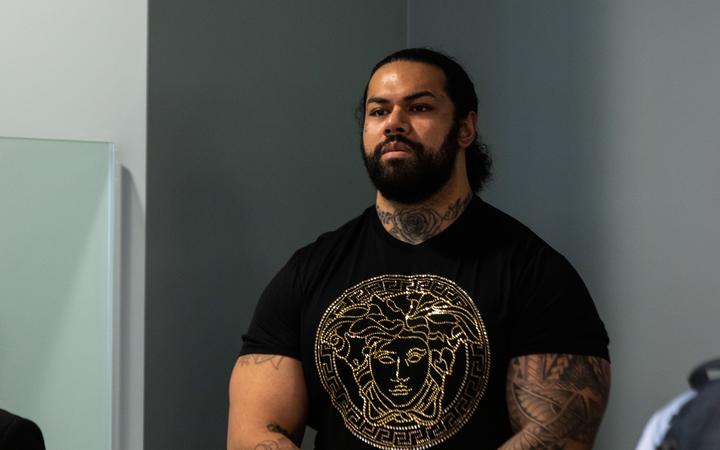This RNZ.co.nz news is republished with permission
Comanchero gang leader Pasilika Naufahu has been sentenced to 10 years in prison.

A High Court jury found Naufahu guilty in October of money laundering and conspiring to supply the class B drug pseudoephedrine.
He was sentenced to 10 years imprisonment by Justice Graham Lang in the High Court in Auckland today.
The public gallery was filled with supporters, including Naufahu’s wife.
Naufahu, president of the gang’s New Zealand chapter, was arrested in 2019 after a large scale police operation.
He was found guilty last year of money laundering and conspiring to supply pseudoephedrine.
Naufahu had previously pleaded guilty to participating in an organised crime group, four charges of money laundering and unlawful possession of ammunition.
He was arrested following the 2019 police raids, as part of Operation Nova, that netted millions of dollars of property, cars, motorbikes and cash.
During sentencing, Naufahu’s lawyer Ron Mansfield said he was a 501 Australian deportee, who had struggled on his arrival to New Zealand.
“In my submission, as this court will see routinely, there is a lack of support for those who are returned to New Zealand under these provisions by the Australians.”
Mansfield said Naufahu had difficulty opening a bank account, obtaining accommodation and could not find employment.
Crown prosecutor David Johnstone said the defence had tried to unreasonably minimise Naufahu’s culpability as the leader of an organised criminal group.
Later, Justice Lang detailed a report describing Naufahu’s life in Australia.
He said the report disclosed Naufahu had a difficult upbringing, featuring financial stress and hardship.
It described how he had suffered with developmental difficulties, which lead to Naufahu being builled and isolated.
He was also teased because of his skin colour, and resorted to acts of violence against people who picked on him.
“Ironically this finally won you the approval of your father,” said Justice Lang.
“Prior to that point, your relationship with your father had been strained and had been marked with acts of violence by your father, towards you.”
Naufahu was expelled from school when he was 15 and later came into contact with Sydney gangs, before finding a brotherhood with the Comancheros, the report said.
He was surprised to be deported, and when Naufahu arrived in New Zealand he was isolated from family and social networks.
Justice Lang said it was unsurprising Naufahu had sought the company of others in a similar situation to himself, which had ultimately led to him establishing the New Zealand chapter of the Comancheros.
It had also ultimately led to the offending, which Justice Lang accepted had been committed in the hope Naufahu’s family would not suffer the same financial depravation of his upbringing.
Justice Lang said the report also hinted Naufahu was considering a change of lifestyle, but he said the chances of this were remote.
